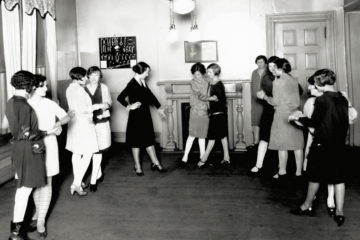‘Returning a seed’

Fledgling liberal Jewish congregation in Germany receives Torah from Temple Israel
By Marshall Weiss, The Dayton Jewish Observer
On June 5, Deborah Tal-Rüttger’s 10-year search for a kosher Torah scroll for her small, liberal Jewish congregation in Germany came to a grand conclusion at Temple Israel. The 161-year-old Reform Dayton temple donated one of its 10 scrolls to Tal-Rüttger’s 16-year-old congregation during Temple Israel’s first Jewish Cultural Festival.
“In 1850, Temple Israel was founded by German-Jewish immigrants,” said master of ceremonies Saul Caplan during the presentation. “Just as those German-Jewish immigrants planted seeds here in 1850, we now offer to return a seed to be planted in Felsberg, Germany.”
The Felsberg congregation, Jüdische Liberale Gemeinde Emet weSchalom e.V. Nordhessen, is one of 31 members of the Union of Progressive Judaism in Germany, an affiliate member of the World Union of Progressive Judaism; WUPJ facilitated the Torah donation.
Of the more than 200,000 Jews in Germany, Tal-Rüttger said roughly five percent identify as Progressive. She said the movement itself, only 17 years old in Germany, combines much of Reform and Conservative Judaism.
“Liberal German Judaism was really wiped out by the Shoah, much worse than the Orthodox,” she said. Reform Judaism was born in Germany in the early 1800s.
“After the war, in Germany, the only Jews that remained were the DPs, the displaced persons, and they were almost 100 percent from Eastern Europe.”
Tal-Rüttger’s parents were born in Stuttgart and fled the Holocaust. She was born in Israel in 1950 and raised on a secular kibbutz. In 1975, she moved to West Germany; her parents had returned there a few years before.
She said the congregations that Eastern European Jews established after World War II in Germany were Ashkenazi Orthodox, as was their custom.
“There were hardly any real Orthodox,” she said. “They would pray the Orthodox way but none of them lived Orthodox. But for our generation, the first post-war generation, this was becoming more and more unattractive.”
As a native Hebrew speaker, she said she couldn’t discern what the cantors were chanting during these services.
“So what we did was stay away. Now that was OK for me. It was OK for my peers because we were brought up Jewishly.”
But it wasn’t OK when it came to passing on Judaism. Her son’s family isn’t Jewish. “I actually realized too late that you cannot pass on Judaism by osmosis,” she said.
For future generations
In the mid-1990s, liberal Jewish congregations began to spring up independently around Germany. Seven met in 1994 to form the Union of Progressive Judaism in Germany. They joined the World Union of Progressive Judaism, which has since funded the first post-war rabbinic school in Berlin and established a cantorial institute in Potsdam.
The UPJ is now a member of the Council of Jews in Germany; as a member of the council, it is beginning to receive funding from the German government.
“The German system is that you pay your taxes, they’re called church taxes,” she said, “and this money is given to the churches and the Council of Jews in Germany to fund the congregations.”
Tal-Rüttger said it took a decade to “ease down the fears” of the Orthodox majority of the Council of Jews in Germany “that this (funding) is a supplement and not going to destroy them; that actually what we are doing is picking those (Jews) up who don’t go there. It’s not either they go to us or to them, it’s either they go to us or they don’t go anywhere.”
One project she spearheaded at her congregation that’s now available to all German Progressive Jewish congregations comprises sets of translations of Jewish prayer services into German and Russian, side by side with Hebrew. Most Jews in Germany are former Soviet Jews who came in the 1990s after reunification and the collapse of the Soviet Union.
Though the World Union accepts patrilineal descent (recognizing a child as Jewish if only the father is Jewish), the German Progressive Union does not. Tal-Rüttger was against the rejection of patrilineal descent but went along with the decision to avoid friction.
Her reason: “Because in Germany you have many cities where you have only one synagogue. Let’s say I live in Mainz and I go to the synagogue and I’m Reform and we have the patrilineal in our bylaws. And then I move perhaps to Bremen and they have only an Orthodox synagogue. They would excommunicate every liberal if we had that in our bylaws.”
Why live in Germany?
Tal-Rüttger said she has never personally experienced anti-Jewish sentiment or attacks in Germany. “Our congregation has gotten in all these years only one hate letter. I handed that hate letter to the police and they actually found the person. That doesn’t mean that there is no antisemitism. There’s antisemitism in Germany just like there is here and in every other place as well. But certainly not the way it used to be.”
She said that Germany, unlike Austria, is dealing with its Nazi past, and is also a strong supporter of Israel.
“For years, world Jewry looked askance upon the Jews of Germany after the war: ‘How can you go to a country like that?’”
She urges Jews around the world to work with Germany’s Jews.
“First of all, it’s a reality. We are there. You can shut your eyes and say the sun is not shining, and it is. And secondly, if you really want to stay away from every country where vicious antisemitism has raged in the past, Europe is out of the question and the Arab countries as well, and north Africa. We can’t all be in Israel and the U.S.A.
“We cannot let Hitler win posthumously. This is what he wanted. He wanted no Jews. So are we really going to give him that satisfaction? And secondly, German-Jewish history is 1,800 years old. Are we going to let those Nazis of 12 years destroy that? No.”





